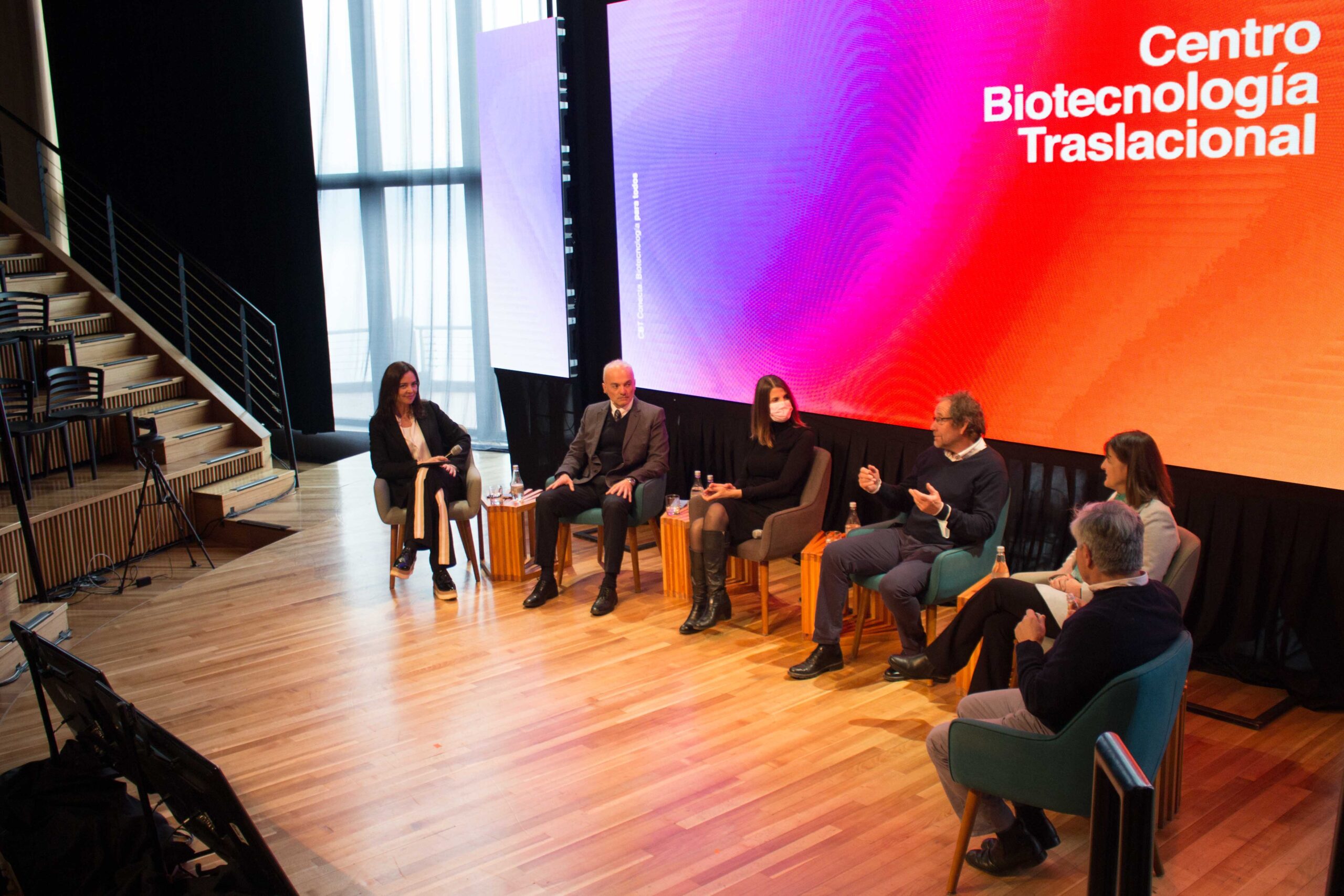At the meeting “Southern Chile: Bioinnovation Pole”, organized by SOFOFA Hub’s CBT, companies, startups, local authorities and universities shared their vision and experience to promote biotechnology from their region and address the local industry’s challenges and opportunities.
On Wednesday, the Teatro del Lago in Frutillar hosted entrepreneurs, academics, business executives and public sector representatives to discuss innovation and biotechnology at a meeting organized by SOFOFA Hub’s Center for Translational Biotechnology (CBT) —supported by CORFO and ANID— and Endeavor Patagonia.
At the meeting, titled “Southern Chile: Bioinnovation Pole”, we confirmed the interest and willingness to work collaboratively to integrate biotechnology as a fundamental tool to solve the challenges of the region’s main productive sectors, sharing national success stories of technological solutions that are leading the innovation ecosystem, both in Chile and abroad.
At the end of the event, Alan García, SOFOFA Hub’s executive director, emphasized that “with the CBT, we are seeking to bring the entrepreneurial and innovation capabilities that we have in Chile’s biotech industry closer to the productive sectors. In this region in particular, the aquaculture, livestock and agriculture sectors see biotechnology as a solution to many of their challenges and as an opportunity for sustainable development.” He added that “this gathering was precisely conceived to strengthen the link between stakeholders that can jointly transform this region into a national technological development pole.”
Maria Paz Merino, the CBT’s deputy director of technology, says that the CBT’s mission has two main focuses: “on the one hand, to create the enabling conditions for the development of the biotech industry; and on the other, to link technological developments with industry, so that good science and good ideas can be applied in industry. The Los Lagos region is an example in this regard, and that is why we decided to kick-off this endeavor here in Frutillar, to define the path that we must follow so that the biotechnology industry can develop, and for it to ultimately generate the impact needed by both society and the economy.”
The regional director of CORFO Los Lagos, Gabriel Pérez Gonzalez, who opened the meeting, explained that “the region of Los Lagos has been positioning itself as an increasingly important innovation and technology pole; today, there are diverse technological-based enterprises that provide solutions to challenges specific to agriculture, health, and aquaculture, contributing —day by day— to sustainability, climate change and the improvement in people’s quality of life. This meeting reflects the potential spawned in this territory, which CORFO will continue to promote through different support lines that seek to encourage both the process of creating new companies with a scientific technological base, as well as the consolidation of those that currently exist, providing tools to facilitate their expansion. ”
Maite Prieto, Science, Technology, Knowledge and Innovation SEREMI, who was one of the meeting’s panelists, welcomed the initiative of holding this gathering in the region of Los Lagos because “it promotes decentralization and values the research, development and technology transfer that is taking place in regions. Additionally, this region concentrates several scientifically and technologically based companies that are focused on the productive sector. I believe this is aligned with the ideas that our office wishes to promote, which is to bring knowledge-generation closer to society, to the productive sector, to solve the problems faced by the community and territories.”
On the other hand, Leo Prieto, keynote speaker who closed the event with an inspiring presentation, stated that “this meeting has been much broader than a bio-innovation seminar. We realized that all these phenomena are not exclusive to one discipline, but rather relate to how we can achieve this greater collaboration, so that we can all work together. Although there were many entrepreneurs present, and that we could have focused our discussions on technical aspects or business ideas, they rather chose to talk about trust, collaboration, decentralization, and how to take chances; which shows that we have to continue working on the human variables, to leverage all the tremendous knowledge we have in this corner of the planet and to create solutions to significant problems.”
Panelists and lecturers
The seminar “Southern Chile: Bioinnovation Pole” was attended by the following panelists:
-
- Eduardo Wallach / CEO Kura Biotech
- Ximena Henzi / General Manager Nutraterra
- Geraldine Mlynarz / General Manager of Ictio Biotech
- Rebeca Galvez / CEO Patagonia Biotechnología
- David Cantero / Head of the Environmental Department at Cecinas Llanquihue
- Fernando Casari / CEO Cran Chile
- Markus Schreyer / The Ganesha Lab founder
- Oscar Berrios / product manager Biomar
- Leo Prieto / CEO LEMU
- Arturo Clement / CEO Salmon Chile AG
- Maite Castro / Science, Technology, Knowledge and Innovation SEREMI for the South Macrozone.
